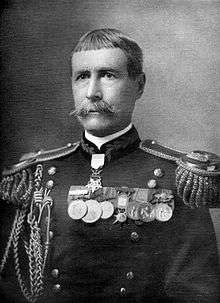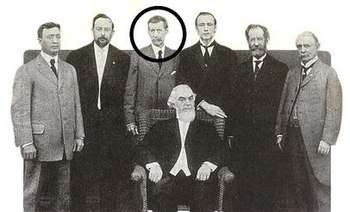William Preble Hall
William Preble Hall (June 11, 1848 – December 14, 1927) was a United States Army Brigadier General who was a recipient of the Medal of Honor for valor in action on October 20, 1879 near the White River, Colorado. An 1868 graduate of West Point, he served in the Army until his retirement in 1912. He was an excellent marksman, serving on the Army distinguished marksmanship teams, 1879–1892, winning medals while shooting both carbine and revolver.[1]
William Preble Hall | |
|---|---|
 William Preble Hall, Medal of Honor Recipient and Adjutant General of the U.S. Army. | |
| Born | June 11, 1848 Randolph County, Missouri |
| Died | December 14, 1927 (aged 79) Washington, D.C. |
| Place of burial | |
| Allegiance | United States of America |
| Service/ | United States Army |
| Years of service | 1868–1912 |
| Rank | Brigadier General |
| Commands held | Adjutant General of the U. S. Army |
| Battles/wars | American Indian Wars Spanish–American War |
| Awards | Medal of Honor |
Early life and career
William was born in Randolph County, Missouri. He was appointed to West Point from the state of Missouri, graduating with the class of 1868.[1][2] His first assignment was with the 19th Infantry. He then served in the 5th Cavalry, the unit in which he was awarded the Medal of Honor. He served principally on Western Frontier duty until the Spanish–American War. It was during a battle with hostile Indians while in command of a reconnoitering party near a camp on the White River, Colorado, October 28, 1879, that he was cited for the Medal of Honor. Hall went to the rescue of a fellow officer who was surrounded by about 35 warriors. He received the medal on September 18, 1897.
He also served in Puerto Rico during the War with Spain, 1899–1900. Another notable accomplishment was that he was a member of several Army distinguished marksmanship teams, from 1879–1892, and won medals on all teams while shooting carbine and revolver.[1][2] He was appointed Adjutant General of the U.S. Army on February 17, 1912, and retired from active duty on June 11, 1912.[3]
While a colonel and Assistant Adjutant General, Hall authored the book "How to Shoot a Revolver," Kansas City: Hudson-Kimberly, 1901 (Ray Riling 1522). The author's preface is dated December 24, 1895.
Personal life
He married Ms. Terese Blackburn (1868–1943), daughter of Senator Joseph Clay Stiles Blackburn of Kentucky. They had a daughter who died in childhood, Terese Preble Hall (1894–1899). Both his wife and daughter Terese are buried with him in Section 1 of Arlington National Cemetery. They had two additional children live to adulthood, Blackburn Hall, a graduate of West Point and former Major of the Regular Army, of Los Angeles, California, and Octavia Preble Hall (1900-1981), who later took the name Terese, and married Colonel Percy McCay Vernon, Regular Army, of Amite, Louisiana.[1]

Gen. Hall is circled, seated is Charles Taze Russell
Hall was associated with the International Bible Students Association (IBSA) for several years before his death. In September 1911, the IBSA appointed a "Missions Investigation Committee", chaired by Charles Taze Russell, to travel to Japan, China, the Philippines, and India in order to make recommendations for future missionary efforts and expenditures,[4] and General Hall was among the seven appointed committeemen.[5][6] In the April 15, 1912 issue of the Watch Tower, the following was published above the signatures of "Adj.-Gen'l W. P. Hall" and the other committeemen:
The gentlemen who have served on this Committee are all earnest Bible Students. Their zeal in the matter of this investigation may be judged from the fact that they not only paid their own expenses, but additionally defrayed Pastor Russell's and all secretarial expenses. These gentlemen have long been deeply interested in the propagation of the Gospel, both at home and abroad.[7]
Speaking of the entire committee, Jehovah's Witnesses' official history says, "Wherever they went they spoke about God's purpose to bring blessings to mankind by means of the Messianic Kingdom. Sometimes their audience was small, but in the Philippines and in India, there were thousands."[8] The Committee presented its report at a March 31, 1912 meeting at the New York Hippodrome, attended by 5,200 and chaired by then-future Watch Tower Society president Joseph F. Rutherford.[9]
Medal of Honor citation
His Rank and organization: First Lieutenant, 5th U.S. Cavalry. Place and date: Near Camp on White River, Colo., 20 October 1879. Entered service at: Huntsville, Mo. Birth: Randolph County, Mo. Date of issue: 18 September 1897.
Citation:
With a reconnoitering party of 3 men, was attacked by 35 Indians and several times exposed himself to draw the fire of the enemy, giving his small party opportunity to reply with much effect.[10]
See also
- List of Adjutant Generals of the U.S. Army
- List of Medal of Honor recipients for the Indian Wars
- List of United States Military Academy alumni (Medal of Honor)
References

- "William Preble Hall". Arlington National Cemetery. Retrieved April 13, 2009.
- "William Preble Hall". FindAGrave.com. Retrieved April 13, 2009.
- Hewes, James E., Jr. (1983). From Root to McNamara - Army Organization and Administration. Washington, D.C.: Government Printing Office. pp. 403–404. Retrieved April 14, 2009.
- Watch Tower, April 15, 1912, page 122, Reprints 5007
- Watch Tower, April 15, 1912, page 137, Reprints 5015
- Jehovah's Witnesses did not conscientiously object to all military service until 1939; see The Watchtower, December 1, 1974, page 734
- Watch Tower, April 15, 1912, page 124, Reprints 5008
- "A World Tour to Further the Preaching of the Good News", Jehovah's Witnesses–Proclaimers of God's Kingdom, page 419
- Watch Tower, April 15, 1912, page 138, Reprints 5016
- "Medal of Honor recipients: Indian Wars Period". United States Army Center of Military History. Retrieved April 13, 2009.
| Military offices | ||
|---|---|---|
| Preceded by Fred C. Ainsworth |
Adjutant General of the U. S. Army February 17, 1912 – June 11, 1912 |
Succeeded by George Andrews |